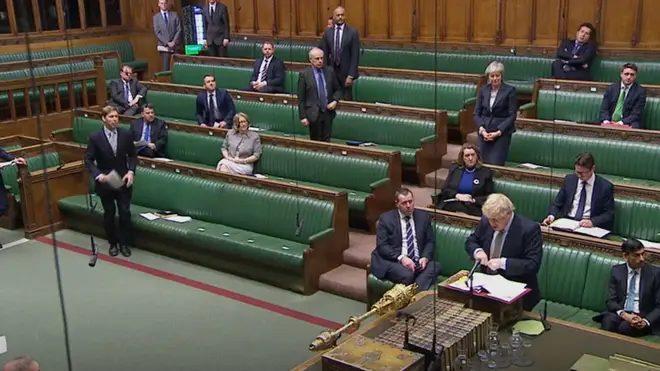
Nick Ferrari 7am - 10am
23 March 2020, 12:48

Boris Johnson will put a six-month time limit on Covid-19 emergency powers which will grant extra powers to tackle the spread of the virus.
Politicians will debate the coronavirus laws later which would give enhanced powers to ministers, councils, police, health professionals and coroners.
[LIVE NEWS: Follow the day's developments as they happen]
As of Sunday morning, there were 5,683 cases in the UK and 281 patients who had tested positive for coronavirus had died during the outbreak.
Some of the changes, as LBC News reported previously, would give extra police and immigration officers extra power to detain those they believe to be infected and compel them to have tests.
It would also reduce the number of doctors required to sign off on sectioning those with mental health issues from two to one, while police would be given authority to force those infected with Covid-19 to self-isolate.
Read more: Prime Minister threatens coronavirus curfew and travel ban
Police officers will be given powers to arrest and isolate people in order to protect public health under the new rules, while the Border Force will be able to shut down airports of transport hubs if there are not enough resources to ensure security.
The plans will also give local authorities the power to direct funeral providers and draft in businesses to supply more vehicles to move bodies, open crematoriums for longer and “streamline the death management process”.
Read more: Coronavirus symptoms - What are they and what is the risk of Covid-19 in the UK?
But a former Cabinet minister is calling for Boris Johnson to go further by introducing a rewritten Bill in 12 months' time if the powers are still deemed necessary.
Read more: Coronavirus: Beard sanitiser sales spike after NHS urged staff to shave
David Davis, the ex-Brexit secretary, said six-monthly reviews were not sufficient to keep such wide-reaching legislation in check and predicted there were likely to be "mistakes" in the 300-plus pages of emergency legislation.
Senior ministers are currently attempting to limit the peak number of infections to reduce pressure on the NHS.
Read more: How long does Covid-19 live on surfaces, and is it safe to get overseas post?
Downing Street sources confirmed that the Government would introduce an amendment to the Coronavirus Bill on Monday to ensure the fresh powers within it had to be renewed every six months.
The announcement followed concern from some MPs that the extensive powers contained in the legislation could be in place for two years.
Read more: Who is a key worker and what children are classed as vulnerable in UK school closures?
But Mr Davis said he feared the current set of powers contained in the fast-tracked Bill would give the Government undue strengths which could infringe on civil liberties.
His comments come after Labour's shadow equalities minister Naz Shah submitted an amendment, backed by 100 MPs, to exempt those from faith backgrounds from automatically being cremated if they die after contracting coronavirus.
There are anxieties, especially among Jews and Muslims whose faiths forbid cremation, that local authorities, in the event the number of deaths increase dramatically, will be able to use the emergency powers to disregard legal safeguards that currently prevent the cremation of human remains against the wishes of the deceased.
Read more: What time is the Prime Minister's daily coronavirus briefing?
Mr Davis said he was personally concerned that powers allowing the Government to postpone elections could be misused.
The civil liberties campaigner said: "This Bill was put together in five days, it is 300-odd pages long.
"It is guaranteed, bluntly, that it will have mistakes and unnecessary elements to it.
Read more: Coronavirus and pregnant women: What is the official government advice?
"Those mistakes will all be in one direction and that's giving more power to the Government than is necessary."
The senior Conservative MP said a six-month sunset clause would not go far enough in terms of checks.
"What's going to happen is we're going to have another one-day debate and we're going to talk about the same 320 pages in six months' time," he added.
Read more: Coronavirus - Who should self-isolate and for how long?
"How is that going to work out? Are we going to amend the Bill? We can't, there's no scope to amend it.
"My view is very different - we accept it is going to be there for a year for safety's sake and that gives you six to nine months to learn what has happened scientifically, what has happened economically and what has happened on the social front.
"We may have no high street by then, no pubs left by then or very few. You just don't know.
"The trick is to write it properly and present it nine months in so we can spend three months looking at it."